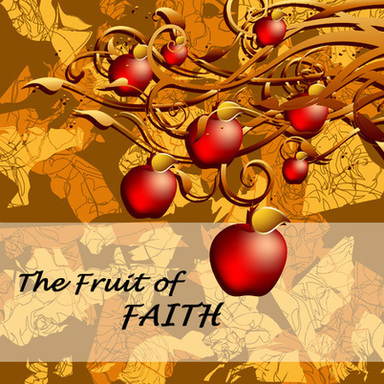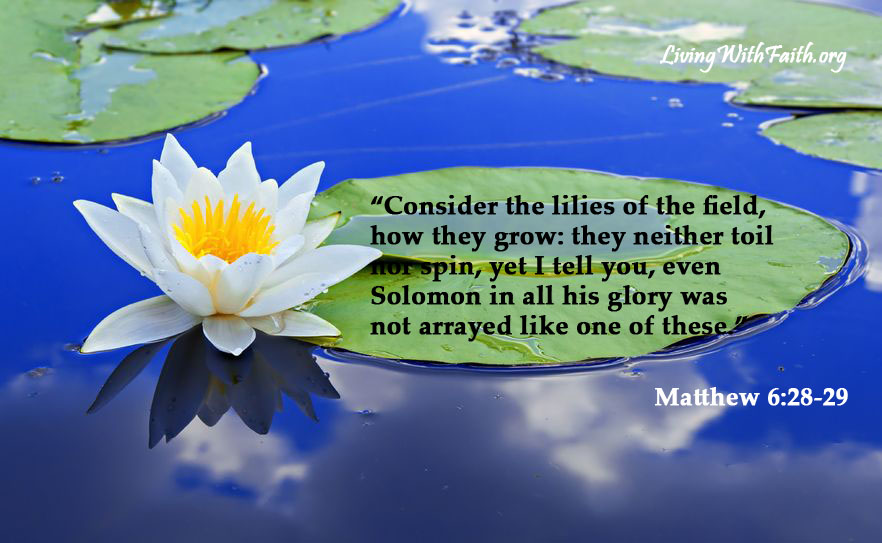Among Christians there are two major and opposite responses to the question of whether faith is something we must produce ourselves or something that God provides. Most Christians of the Calvinist and Reformed traditions believe that faith is entirely a gift that is given to us by God, while most other Protestant Christians believe that faith is a response to God on our part. The question is an important one as it affects how we understand many parts of the Bible and how we see faith itself. Our new article looks at what the biblical evidence is on this important subject – read it here.
|
Among Christians there are two major and opposite responses to the question of whether faith is something we must produce ourselves or something that God provides. Most Christians of the Calvinist and Reformed traditions believe that faith is entirely a gift that is given to us by God, while most other Protestant Christians believe that faith is a response to God on our part. The question is an important one as it affects how we understand many parts of the Bible and how we see faith itself. Our new article looks at what the biblical evidence is on this important subject – read it here. Unfortunately, many Christians see doubt as something synonymous with unbelief – as though doubt and belief cannot exist at the same time. This viewpoint is based largely on a misunderstanding of what the apostle James says: “you must believe and not doubt, because the one who doubts is like a wave of the sea, blown and tossed by the wind. That person should not expect to receive anything from the Lord. Such a person is double-minded and unstable in all they do” (James 1:6–8).
While James’ statement might seem at first sight to be against any kind of doubt, if we look at the context of what he says we realize that the apostle is talking about a specific kind of doubt that we must shun. There are two possibilities. First, notice that James uses the expression “double minded” of the doubter, and he uses it again in the fourth chapter of his letter: “Cleanse your hands, you sinners, and purify your hearts, you double-minded” (James 4:7). The context of this second use of the expression is clear: “Do you not know that friendship with the world is hostility toward God? Therefore, whoever chooses to be a friend of the world renders himself an enemy of God” (James 4:4). So the first possibility is that in condemning doubting in 1:6-8, James is referring to the kind of double-mindedness that a person has who is not truly given over to God – a person who has “one foot” in his religion, but the other foot solidly planted in the world. If James is using the expression “double-minded” with the same meanings in chapter 1 and 4, then he is telling us that a “friend of the world” who is torn between two loyalties cannot expect God to answer his or her prayers. Alternately, if James is using “double-minded” in a different and more limited sense in chapter 1 – meaning someone who does not know for sure if God will answer his or her prayers – then the outcome is the same: they will not be answered. But these are the only two meanings of doubting and double mindedness that can possibly be found in what James says in 1:6–8. Contextually, there is simply no way that this passage can be somehow expanded to mean doubts of any kind – such as intellectual doubts about the meaning of a given scripture, or as to what is God’s will in a certain situation. These kinds of doubts or uncertainties need not be seen as being somehow unchristian, and they are certainly not equivalent of disbelief. In his excellent book In Two Minds, first published in 1976, author and social critic Os Guinness clearly explains the difference between doubt and unbelief: "Doubt is not the opposite of faith, nor is it the same as unbelief. Doubt is a state of mind in suspension between faith and unbelief so that it is neither of them wholly and it is each only partly. This distinction is absolutely vital because it uncovers and deals with the first major misconception of doubt – the idea that in doubting a believer is betraying faith and surrendering to unbelief" (In Two Minds, page 27). Guinness points out that failure to understand the true nature of this kind of intellectual doubt often causes great anxiety to many who experience such uncertainties, yet who are sincerely committed to God. He continues to illustrate this fact in the following way: "The word unbelief is usually used of a willful refusal to believe or a deliberate decision to disobey. So, while doubt is a state of suspension between faith and unbelief, unbelief is a state of mind which is closed against God, an attitude of heart which disobeys God as much as it disbelieves the truth ... Doubt is not the opposite of faith, unbelief is" (pages 27,30). We should not see doubts that are occasional or limited to small or specific areas of uncertainty as being somehow spiritually wrong, therefore. We should always address our doubts and resolve them quickly if possible, but just like temptations they are not in themselves sin – only when a temptation or doubt is acted upon does it become sinful (Romans 14:23; etc.). We should always remember that Jesus accepted and helped the man whom he had told “All things are possible for one who believes” and who sincerely prayed “I do believe; help me overcome my unbelief!” (Mark 9:23–24). This is in itself clear proof that James does not mean that a person with any kind of doubts cannot have answered prayer. Jesus also continued to accept and work with his disciple Thomas to move him through his doubts (John 20:24–29). Doubts that are not based on the kind of double-mindedness that is not truly committed to God or simply cannot accept that God can or will help us are neither unbelief nor do they preclude God working with us. Such doubts are, in fact, often normal temporary uncertainties that are met and, with God’s help, eventually dispelled in the normal lifetime path of faith. Matthew and Mark both tell the story of Jesus healing the daughter of a Gentile woman in one of the cities of Syrophoenicia on the Palestinian coast: “And … he arose and went away to the region of Tyre and Sidon. And he entered a house and did not want anyone to know, yet he could not be hidden. But immediately a woman whose little daughter had an unclean spirit heard of him and came and fell down at his feet. Now the woman was a Gentile, a Syrophoenician by birth. And she begged him to cast the demon out of her daughter. And he said to her, ‘Let the children be fed first, for it is not right to take the children's bread and throw it to the dogs.’ But she answered him, ‘Yes, Lord; yet even the dogs under the table eat the children's crumbs.’ And he said to her, ‘For this statement you may go your way; the demon has left your daughter.’ And she went home and found the child lying in bed and the demon gone” (Mark 7:24-30 ESV, and see Matthew 15:21-28). Mark makes it very clear that the woman was a Gentile, a Syrophoenician (the NIV calls her “Greek” because the Jews referred to all non-Jews as “Greeks”), and seems to also stress her gender – putting her at a double disadvantage as a member of an ethnic group and gender looked down upon by many ancient Jews who often used the term ”dogs” of Gentiles as impure according to God’s Law. We should remember that religious Jews did not like to be approached in conversation by Gentiles and particularly by women. The woman’s approach to Jesus is all the more remarkable as she clearly knew about Jewish culture. Jesus apparently rebuffed her at first, saying: “I was sent only to the lost sheep of Israel” (Matthew 15:24), and, when she persisted, “Let the children be fed first, for it is not right to take the children's bread and throw it to the dogs.” This led to the woman’s amazing reply in pleading that even the dogs were able to pick up crumbs under the children’s table, for which words Christ rewarded her with the healing of her daughter. Reading this account superficially, Jesus’ reaction to the woman, effectively referring to her as a “dog,” seems harsh and out of character, but we should consider two things. Instead of the Greek word kinos “dogs,” Mark actually uses the word kinaria – the diminutive form used of “little dogs” or “puppies.” This considerably softens the tone of Jesus’ words, though the implication is still there, kindly worded or not. We can only presume then, that Jesus’ words were meant not to disparage the woman but to see the extent of her humility and faith. This is a meaningful possibility to keep in mind, because Jesus’ reaction was immediate and full as soon as the woman replied in such a way to indicate her humble acceptance of his words and her faith in him despite any insult she might have perceived. If this was the case, the lesson for us is obvious. Whenever we are faced with difficulties and trials that we need to take before God, we should remember that it is possible to approach him with both accepting reverence and persistence (see also Jesus’s parable on the importunate widow, Luke 18:1-8). The example of the Syrophoenician woman shows us that our faith must be willing to humbly accept the present answer, but we should also be unafraid to persist in asking God’s favor. “… we ourselves boast of you among the churches of God for your patience and faith in all your persecutions and tribulations that you endure” (2 Thessalonians 1:4 NKJV).
The Bible often speaks of faith and patience in combination – prompting us to ask, “Can we have true faith without patience – or even true patience without faith?” The answer to these questions is found in understanding the relationship between the two qualities. Every Christian knows the importance of faith, hope and love (1 Corinthians 13:13), but sometimes we need to be reminded that these things are completely interrelated rather than existing in isolation. It is sometimes hard to see this, because different terms are often used, so we don’t always see the connection. An example is the way in which faith and patience interact. Biblically, patience is a form of hope. We see this fact in many scriptures: “But if we hope for what we do not yet have, we wait for it patiently” (Romans 8:25); “We remember … your work produced by faith, your labor prompted by love, and your endurance [patience] inspired by hope …” (1 Thessalonians 1:3). But patience can mean different things in the Bible. For example, the Greek word makrothumia, often translated “longsuffering,” relates to patience with people, whereas the word upomone is generally patience with regard to things or circumstances. It is this patience with the circumstances and conditions in which we find ourselves that ties into faith – supporting it and being supported by it. Notice how the two qualities of faith and patience interact. Paul tells us: “… we also glory in our sufferings, because we know that suffering produces perseverance [patience]” (Romans 5:3). James tells us “ … count it all joy when you fall into various trials, knowing that the testing of your faith produces patience” (James 1:2-3 NKJV), and Peter elaborates: “In all this you greatly rejoice, though now for a little while you may have had to suffer grief in all kinds of trials. These have come so that … your faith ... may result in praise, glory and honor when Jesus Christ is revealed” (1 Peter 1:6-7). These scriptures, and many others, show us that two things occur when we suffer as Christians. On the one hand, the sufferings refine our faith making it better, stronger (mentioned by Peter). Sufferings also produce patience in us (mentioned by James and Paul). The two qualities are both needed to withstand problems. Faith without patience produces Christians who may start off well, but who eventually falter in their faith and fall away or burn out. On the other hand, patience without faith produces individuals who experience suffering but do not profit from it in the way God intends. It is to the degree that we employ both patience and faith in our suffering that we are strengthened and endure, and it is that endurance which is ultimately necessary to succeed in the Christian life (Matthew 10:22; Matthew 24:13). Simply put, patience needs faith and faith needs patience. As the Book of Hebrews confirms, we need both qualities in our lives if we are to: “Imitate those who through faith and patience inherit what has been promised” (Hebrews 6:12).  Acts 9 tells the story of the conversion of Saul, one of Christianity’s greatest early enemies, to Paul - one of the faith’s greatest servants. The chapter not only tells us that Saul was “breathing out murderous threats” against the early disciples, but also that he was hunting them down and conveying them to prison. As Saul neared Damascus, however, intending to hunt Christians in that city, Acts tells us that the resurrected Jesus stopped him and, taking away his sight, commanded him to go into the city and to wait till he was told what he must do. The account says that for three days Saul was blind, and did not eat or drink, but prayed. We can only imagine how Saul must have felt at this time – realizing the evil he had been committing. This was doubtless one of the most soul-wrenching conversions ever to take place, and Saul’s level of repentance was clearly as deep as humanly possible (Acts 9:1-9). But that’s the story as we know it, from our perspective – in nice safe hindsight. Now see the story from the perspective of Ananias – a Christian living in Damascus who was well aware of the destruction Saul was wreaking on the faithful. “In Damascus there was a disciple named Ananias. The Lord called to him in a vision, ‘Ananias!’ ‘Yes, Lord,’ he answered. The Lord told him, ‘Go to the house of Judas on Straight Street and ask for a man from Tarsus named Saul, for he is praying. In a vision he has seen a man named Ananias come and place his hands on him to restore his sight’” (Acts 9:10-12). It’s probably almost impossible to imagine how that instruction really felt to Ananias, but we get a glimpse of his reaction in his reply to the Lord: “‘Lord,’ Ananias answered, ‘I have heard many reports about this man and all the harm he has done to your holy people in Jerusalem. And he has come here with authority from the chief priests to arrest all who call on your name.’ But the Lord said to Ananias, ‘Go! This man is my chosen instrument to proclaim my name to the Gentiles and their kings and to the people of Israel’” (Acts 9:13-15). I think we have to put this in modern terms to even begin to understand the situation. Suppose you were a Jew living in hiding in World War II Europe, and God told you to go meet one of the highest ranking officers of the SS or the Gestapo. Imagine you lived in Soviet Russia, or today in North Korea, where Christians are routinely executed, and were told to go help the head of the secret police responsible for eliminating Christians. But look at Ananias’ response: “Then Ananias went to the house and entered it. Placing his hands on Saul, he said, ‘Brother Saul, the Lord – Jesus, who appeared to you on the road as you were coming here – has sent me so that you may see again and be filled with the Holy Spirit.’ Immediately, something like scales fell from Saul’s eyes, and he could see again. He got up and was baptized (Acts 9:17-18). We read over those last few words telling us that Saul “got up and … was baptized,” but imagine Ananias’ feelings waiting to see exactly what Saul would do once his sight was restored. Was this just a trap? What would Saul do next? The obedience and faith that Ananias demonstrated in going to Saul and helping to restore his sight were incredible, to say the least. It was an act of faith and bravery equivalent to helping a lion out of a trap. And notice one more detail about the way in which Ananias did this. It may seem like a small detail until you think it through, but the extent of Ananias’ faith was such that the man not only obeyed God’s instruction, but also fully accepted his enemy by addressing him with the words “Brother Saul.” The level of Ananias’ faith is seen again toward the end of Acts 9 which records that after his conversion Saul returned to Jerusalem, and that: “When he came to Jerusalem, he tried to join the disciples, but they were all afraid of him, not believing that he really was a disciple” (vs. 26). Ananias not only accepted God’s word in faith while it was still unclear what Saul’s intentions were, but also he accepted Saul as a brother. Ananias is one of the many who, although not mentioned by name in the great “Faith Hall of Fame” found in Hebrews 11, can nevertheless be included in the “all these” individuals of Hebrews 11:39 – the many others who are likewise worthy of inclusion. His name in Acts is the Greek form of the Hebrew name Hananiah: “favored of the Lord,” and Paul himself later described Ananias as “a devout man according to the law, having a good report of all the Jews” (Acts 22:12). According to tradition he was eventually martyred, but we can presume that this man of God died in full faith. New Testament scholar F. F. Bruce sums up the life of Ananias in saying that he “has an honored place in sacred history, and a special claim upon the gratitude of all who in one way or another have entered into the blessing that stems from the life and work of the great apostle [Paul]” (F. F. Bruce, Commentary on the Book of the Acts, page 201).  The two unmistakable themes of the Gospel of John are belief and love.* Although John sometimes stresses these concepts separately, he also frequently connects them, as we see in verses such as John 3:16: “For God so loved the world that he gave his one and only Son, that whoever believes in him shall not perish but have eternal life” (emphases added here and in the following scriptures). John also shows how the two great themes of love and belief were tied together in the words of Jesus himself: “… the Father himself loves you because you have loved me and have believed that I came from God” (John 16:27). When we move beyond John’s Gospel to his epistles, we find the same two themes are also linked there. For example, the connection between belief and love is perfectly summarized in a single verse in the apostle’s first letter: “And this is his command: to believe in the name of his Son, Jesus Christ, and to love one another as he commanded us” (1 John 3:23). But although these two themes are clear enough in John’s writing, we do not always notice that he is teaching us an important lesson regarding them: that the one spiritual quality affects the other. Belief Increases Love Notice what John says regarding the first aspect of this interaction – that of belief affecting love. In 1 John 4:19 the apostle tells us: “We love because he first loved us.” Although the word belief does not appear directly in this verse, the concept is obviously implied – we come to love God because we believe God first loved us. John connects belief with love in many other verses in this letter – such as 1 John 5:1 where he tells us: “Everyone who believes that Jesus is the Christ is born of God, and everyone who loves the father loves his child as well.” But John evidently did not feel the necessity to elaborate on the connection between belief and love, as it is not a difficult one to see for ourselves in our own personal experience: the more we come to see and understand God and believe in him and his nature, the more we come to love him. Put simply, the more we come to know God, the more we come to love him. Love Increases Belief But John also shows this principle is reciprocal: the more we love God, the more our belief is strengthened. Consider the following verses. “Everyone who loves has been born of God and knows God. Whoever does not love does not know God, because God is love” (1 John 4: 7B). In this case, love is mentioned first and then knowing God – our belief in him – comes as a result. It is easy to read over this verse without seeing the connection John is making, but it is clear once we focus on it. The apostle makes the same connection in other verses. For example: “No one has ever seen God; but if we love one another, God lives in us and his love is made complete in us” (1 John 4:12). What proof do we have of God? John asks. His answer is straightforward – if we truly love one another, then God is living in us and we experience him in our lives in this way. John looks at the other side of this situation a few verses later: “… whoever does not love their brother and sister, whom they have seen, cannot love God, whom they have not seen” (1 John 4:20). This obviously has vital relevance for Christian life and belief. As we come to love, John tells us, we come to experience God – and so to believe in him. Near the end of his letter, John unites the two principles of love and belief once again: “In fact, this is love for God: to keep his commands… This is the victory that has overcome the world, even our faith” (1 John 5:3). John is not alone in making this connection. The New Testament shows on many occasions that spiritual qualities, such as belief and love, do not exist in a vacuum. The apostle Paul, for example, wrote on how belief interacts with love: “…The only thing that counts is faith expressing itself through love” (Galatians 5:6). John’s epistles show the same truth from both directions – the more we come to truly believe, the more we will also love; and vice versa, the more we truly love, the more we will come to truly believe. Ultimately, for John, love and belief cannot be separated. We cannot develop the kind of love God exhibits without believing, or truly know and believe God without loving. As has been wisely said, “Belief is the eye of love, love is the heart of belief.” Both are necessary for the eternal life that, John tells us, God has desired to give us from the beginning (1 John 2:24). * See the chapter on these two themes in our free e-book Inside the Four Gospels.  [This blog post was first published on our sister site just before Typhoon Haiyan devastated large parts of the Philippines in November 2013. It is just as relevant now in the wake of Hurricanes Harvey, Irma, Maria, and others that have followed. Hopefully, our prayers and any other support we are able to provide will continue to be with those whose lives have been affected by these and other storms.] Sometimes it’s not the storm we are expecting that hits us; but whatever the storm, we can learn from it. It was the weekend he said the tropical storm was supposed to hit his Gulf Coast hometown. His email said they were preparing for a big storm. A dangerous storm. That storm never hit, but a couple of days later his young son was hit by a car while riding his bicycle to school. With his son hospitalized in serious condition, another storm – my friend’s own personal storm - had arrived. It seems that life is often like that. Sometimes the storm doesn’t hit when it’s expected, sometimes it’s not the expected storm that hits. Sometimes it’s not that which we fear that comes upon us, it’s that which comes out of left field, seemingly out of nowhere. It’s not the disease we fear because of family history, but a different one that we contract. It’s not the illness we are checked for, but another one that shows up in the testing. Yet we learn things in storms we do not learn otherwise. The Book of Job is instructive in this area. Job’s ultimate life storm was certainly unexpected and terrible, but “the LORD spoke to Job out of the storm” (Job 38:1, 40:6). It’s a truth that we learn through our storms, the things we suffer, as even Christ himself did (Hebrews 5:8), and that surely is the message of Romans 8:28 – that all things work together for good. This doesn’t mean that the destruction caused by storms is good or that suffering is ever trivial or easily discounted; but that good can come out of the storm and faith is formed and deepened in these times. It’s hard to think about storms without remembering the story recorded in the Gospels of how a great storm came up while Jesus and his disciples were crossing the Sea of Galilee (Matthew 8:23-30). Despite the storm, Jesus was sleeping peacefully on the boat until he was wakened by his fearful disciples asking him to save them. “He replied, ‘You of little faith, why are you so afraid?’ Then he got up and rebuked the winds and the waves, and it was completely calm. The men were amazed and asked, ‘What kind of man is this? Even the winds and the waves obey him!’” (vs. 26-27). The disciples learned something from this experience about the Son of God and how God can control the outcome of storms in our lives. Katrina, Hugo, Sandy, Harvey, Irma and many others brought great suffering, as future storms will also. Other types of storms in our lives are no different. But for the Christian, every life storm is an opportunity for God to work something within us that might not have been there otherwise. Believing good can be brought out of the storm does not mean the storm is good, but that the One who allows the storms of life to touch us and teach us has the power, when he is asked, to calm the storms around and within us.  Basic as it might seem, the concept of faith can be confusing for many people. The word itself can be understood as what we believe (“the Christian Faith”) or how we believe (“their faith is strong”), though the Bible usually uses the word in the second sense. But even if we focus on faith in the sense of how rather than what we believe, many people still only understand part of what faith is all about. Belief and Trust First, the word used in the New Testament for faith (pistis) primarily means belief and trust. It involves not only believing that God exists, but also trusting him. When Jesus taught “… believe the gospel” (Mark 1:15), he was not just saying believe that the gospel exists, but trust that the message of the gospel is true. In the same way, the author of the Book of Hebrews wrote “… faith is confidence in what we hope for and assurance about what we do not see … And without faith it is impossible to please God, because anyone who comes to him must believe that he exists and that he rewards those who earnestly seek him” (Hebrews 11:1, 6). This makes it clear that faith involves both belief and trust. Faith and Faithfulness However, there is another aspect to faith that even many Christians miss. To see that dimension of faith it helps to go back to the Old Testament. In the book of the prophet Habakkuk there is a vitally important verse that was translated in the King James and some other English translations as “… the just shall live by his faith” (Habakkuk 2:4). But the New International Version and several other recent versions translate this verse as “…the righteous person will live by his faithfulness.” Why the different translations? The answer is that the Hebrew word translated “faith” in the KJV really can mean either “faith” or “faithfulness” (see Isaiah 11:5 where the word is used of the faithfulness of the Messiah). This verse in Habakkuk was seen as so important by the early Christians that it is quoted three times in the New Testament – twice by the apostle Paul (Romans 1:17, Galatians 3:11) and once by the author of Hebrews (Hebrews 10:38). Looking at the context of these verses we see that while Paul stresses that the believer is justified by faith, the author of Hebrews stresses the aspect of the believer’s faithfulness (see verse 36). So true faith can – and should – involve both a trusting belief in God and also faithfulness on our part. Faith and works are sometimes said to be antithetical, but they are not. Although the Bible says clearly that we are saved by faith, not works (Romans 3:28, 31), it also shows just as clearly that living, saving faith will produce good works (James 2:17). In that sense the aspects of believing faith and active faithfulness are both expressed in true faith. The Gift of Faith in All its Aspects Although we may have some limited human level of faith, deep faith is a gift of God (1 Corinthians 12:9, Ephesians 2:8) that is developed through ongoing spiritual growth and transformation (Romans 4:20, 12:6, Jude 1:20), and this applies just as much to our trust in God as to our faithfulness toward him. In all of this we see that true faith is far more than just an emotional feeling or even a belief. True faith involves a living trust in God that affects every aspect of our lives. But at its most basic level, true faith is belief and trust on the one hand and faithfulness on the other. * Extracted from our free e-Book These Three Remain: Why Faith, Hope and Love Are Even More Important Than You Think. Multiple formats are available to read on any computer or e-Reader here.  When we think of faith, hope, and love, we think, of course, of the apostle Paul’s words in 1 Corinthians 13:13: “And now these three remain: faith, hope and love …” It’s a scripture every Christian knows and one of the first ones we may memorize. But many do not realize how important these three qualities are in the writings of Paul. He is the only New Testament writer who groups faith, hope, and love together in quite this way, though the Book of Hebrews – which was clearly heavily influenced by Paul, even if he was not its author – is the only other New Testament book that does group the three qualities directly (Hebrews 10:22-24). For Paul, faith, hope, and love were more than just the topics of an important section of his letter to the Corinthian church. The three qualities appear grouped together in almost every one of the apostle’s letters, though we may not always see it. Paul sometimes mentions only one or two of the three concepts in a given verse, so it may not be obvious that they are all present in the same chapter or letter, but the three qualities permeate almost everything Paul wrote and are frequently found bound together in the same way we find them grouped in 1 Corinthians 13:13. Consider these three verses: “… the faith and love that spring from the hope …” (Colossians 1:5). “… your work produced by faith, your labor prompted by love, and your endurance inspired by hope” (1 Thessalonians 1:3). “putting on faith and love as a breastplate, and the hope of salvation as a helmet” (1 Thessalonians 5:8). Sometimes Paul includes faith, hope, and love in longer lists of spiritual qualities, and we may not connect them as we read the list, but the main reason we may not see how frequently Paul uses this great triad in his writing is that he often varies the expression faith, hope, and love by replacing one of the qualities with a related one which suggests the same thing from a specific angle. In these cases we can learn much regarding how Paul thought about faith, hope, and love by seeing what words he uses to substitute for these qualities. Take, for example, the way Paul often substitutes “endurance” for hope (just as we saw them connected in 1 Thessalonians 1:3, above): “pursue … faith, love, endurance …” (1 Timothy 6:11); “… your faith is growing more and more, and the love all of you have for one another is increasing… we boast about your perseverance and faith in all the persecutions and trials you are enduring” (2 Thessalonians 1:3-4); “Teach the older men to be … sound in faith, in love and in endurance” (Titus 2:2). The concepts of hope and endurance are clearly related, and by writing endurance instead of hope, Paul stresses that particular aspect of hope in what he is saying. Sometimes, just as he uses “endurance,” the apostle uses “patience” as another synonym for hope (2 Timothy 3:10, etc.). If we look at another example: “… faith, love and holiness …” (1 Timothy 2: 15), we find holiness taking the place of hope, and these two qualities are also connected, as Paul shows in speaking of the hope we have in the promises of God: “Therefore, since we have these promises, dear friends, let us purify ourselves… perfecting holiness out of reverence for God” (2 Corinthians 7:1). So too, when Paul writes of “… sound teaching, with faith and love” (2 Timothy 1:13), he uses sound teaching in place of hope – which might seem strange, but right teaching gives us hope, and if we look carefully at the context in which Paul writes this to Timothy, it is, in fact, one of hope (vs. 12). As a final example, notice the way Paul uses “good conscience” as the basis for hope in his letter to Timothy: “The goal of our instruction is love from a pure heart and a good conscience and a sincere faith” (1 Timothy 1:5). Paul’s point is clear in making this substitution – it is only when our consciences do not condemn us that we have true hope. We have only considered variants of “hope” in these examples, but if you look for them you will find that Paul frequently varies the words he uses for each of the three great qualities. We can learn a great deal by being aware of this fact and letting it teach us. So next time you see faith, hope, and love – or something similar – in the writings of Paul, think about it. Ask yourself what you can learn about these vital qualities of Christian living through Paul’s choice of words and how they may illuminate the context of what is being said. Often this small technique can open up unexpected insights into some key areas of Paul’s teaching. It’s a way we can come to better understand the three things that Paul tells us – repeatedly – matter the most. * Download our free e-book on faith, hope, and love and read it on any computer or e-reader and on many smart phones!  “For I am not ashamed of the gospel of Christ, for it is the power of God to salvation for everyone who believes, for the Jew first and also for the Greek. For in it the righteousness of God is revealed from faith to faith; as it is written, “The just shall live by faith” (Romans 1:16-17 NKJV, emphasis added). Paul’s words “from faith to faith” as we find them in the King James Version and a number of other English renderings of the New Testament is a puzzling one – as we can see in the confusing range of translations found in other versions. Compare a few examples of how these words are translated: “from faith to faith” NKJV “from faith for faith” ESV “out of faith into faith” HSB margin “by faith from first to last” NIV It is easy to see why some translations opted for “from faith to faith” because Paul had just mentioned the belief of the Jews and then the Gentiles (vs. 16). But this meaning does not fit well for a number of reasons – which is why a great many modern translations do not use “from faith to faith.” The underlying Greek from which the expression is translated, ek pisteōs eis pistin, literally means “from [or out of] faith into faith,” but how do we interpret this? The expression has been understood to mean many things. For example: From immature faith to mature faith From the faith of the Old Covenant to the faith of the New Covenant From faith in the law to a faith in the Gospel From human faith to the faith given by God This wide range of possible meanings is confusing, to say the least, but Paul gives us an important clue to what he meant. After using the expression “from faith to faith,” Paul then quotes Habakkuk 2:4b, saying: “as it is written, ‘The just shall live by faith.’” When we look at what that Old Testament prophet wrote, we find that “the just shall live by faith” was used in a context showing that although the enemies of God arrogantly follow their evil ways (vss. 3-5), the righteous trust and live their faith. As a result, the righteous are spared and live by virtue of their faith (vs. 4b). If Paul is using Habbakuk’s words with this apparent meaning, then just as the Old Testament prophet tells us the righteous will live by their faith, so Paul is stressing the righteous will live by faith. If understood in that straightforward manner, “from faith to faith” or “from faith into faith” would mean essentially “starting in faith and ending in faith” – exactly how the NIV translates this expression – with the connotation of “totally by faith.” There is another indication this may be the intended meaning. Paul uses similar expressions – “from death to death” and “from life to life” – in 2 Corinthians 2:16 where the reduplication of the words death and life seem to simply stress their meanings – as in “total death” and “total life.” So although it is the least literal of the translations we have considered, the New International Version seems to present wording closest to what Paul meant by “from faith to faith.”  The historical setting for the New Testament Book of James is extremely important, as it can help us understand a great deal of what the apostle wrote. Our new article: "The Epistle of James: Faith in Difficult Times" gives a little bit of the background that can open up your understanding of much that is written in this important epistle. You can read it here.  “Now faith is confidence in what we hope for and assurance about what we do not see” (Hebrews 11:1). Hebrews 11:1 is a scripture we all know well in the context of faith – it is, after all, the Bible’s own definition of faith. But in the New International Version of the Bible – quoted above – that so many of us use regularly, the word “assurance” is perhaps a poor choice of translation into English. On a scale of one to ten – where one is something that might possibly happen and ten is something that will happen without any doubt – most of us would rank the word “assurance” as perhaps a five! The word does not really convey a lot of certainty – we speak of having to “reassure” people because the original assurance may not have been enough. Other English translations use stronger words such as “evidence” (KJ and NKJV) or “proof” (HCB), and these seem to better convey the sense of what Hebrews is telling us. Actually, the underlying Greek word which is translated “assurance” in Hebrews 11:1 is hypostasis – a word formed from stasis “to stand” and hypo “under.” The combined hypostasis or “standing under” refers to the ground on which something is built or the foundation of a house or other building. In fact, this basic meaning of “foundation” gave rise in ancient Greek to the use of hypostasis to mean, by extension, “real estate” or “property” and specifically the title deeds or documents recording the ownership of property. In the ancient world, just as today, home or property ownership was recorded in “title deeds” and these documents were kept as the proof of ownership. Archaeologists have found such deeds hidden under the floors of homes in many cultures. This usage of the word hypostasis for “title deed” was anciently very common. J.H. Moulton and G. Milligan's authoritative Vocabulary of the Greek Testament states that hypostasis can mean “property, effects, written undertaking, agreements of sale, evidence of ownership” and that “… in all cases there is the same central idea of something that underlies visible conditions and guarantees future possession.” Moulton and Milligan conclude that this is the essential meaning of hypostasis in Hebrews 11:1, so we can legitimately translate this verse as “Faith is the title deed of that which we do not see.” Just as ancient peoples carefully placed the title deeds to their homes in places where they would be protected, today we usually place the title deeds to our homes or other property in our bank’s safe deposit box. If we ever need proof that we own our home and that it is indisputably ours, we need only look to the title deed we have stored in the bank. In saying that faith is the “title deed” of that which we hope for, but do not yet see, the author of Hebrews is using a far stronger word than “assurance.” Hebrew s 11:1 is telling us in effect that the faith we are given is the title deed – the guarantee – of our possession of something even if we do not see it now. That assurance is a ten on the scale of one to ten – it’s a certainty we can take to the bank.  “But someone will say, “You have faith; I have deeds.” Show me your faith without deeds, and I will show you my faith by my deeds” (James 2:18). This scripture has puzzled generations of Bible commentators. It is easy to read over it and not see the apparent contradiction, but in the first half of the verse James gives a theoretical situation in which someone compares or contrasts their deeds with someone else’s faith; but in the second half of the verse James replies to this person as though they are the one with faith and he is the one with deeds. Over the years, commentators have gone so far as to suggest that perhaps some part of this verse was lost, or that James was confused and accidentally used the wrong pronouns in the second half of the verse, but such explanations should never be accepted if a possible answer to the apparent problem can be found. Some have wondered if the “someone” in the first half of verse 18 is James himself, as if he is quoting himself, but a clear understanding of this verse is possible without resorting to unwarranted changes to the text or unlikely readings of it. If we look at the Book of James as a whole, we find that the apostle uses statements by imaginary individuals who are in error four times – for example, James 2:16: “If one of you says to them, ‘Go in peace; keep warm and well fed,’ but does nothing about their physical needs, what good is it?” In all these cases, the context clearly shows that the imaginary person is wrong in what they say. James 2:18 is no different. In the previous verse, James tells us “… faith by itself, if it is not accompanied by action, is dead” (James 2:17), so we know what his position is on this matter. In verse 18 James then uses a hypothetical person to reply that surely that is not so – that one person might have faith and another have works; just as one person, to follow what Paul tells us, might have the gift of prophecy and another the gift of speaking in languages (1 Corinthians 12:10). This hypothetical person is separating faith and works as things that can stand alone. It is to this error that James then replies by saying, in effect: “Prove it!” – “Show me what you call your ‘faith without deeds.’” This is using the pronoun “your” in the way we might say to someone “I don’t want your Communist ideology” – meaning the idea they are putting forward, not that Communism is actually that person’s idea. Then James continues by saying, again in effect: “Because I can show you my faith by my deeds.” As we read the following verses in James 2 we see that this understanding makes perfect sense. A hypothetical speaker who argues for salvation by faith or works is corrected by clear statements that saving faith and works cannot be separated. James’ message is that we will not be saved by works or by faith without works – if we have true faith, it will be producing good deeds just as a healthy plant naturally produces fruit. In verse 20 James states “You foolish person, do you want evidence that faith without deeds is useless?” and he proceeds to give examples of good works from the lives of people of great faith. In verse 26 he concludes: “As the body without the spirit is dead, so faith without deeds is dead.” We can have faith without resultant good works (James 2:19), but James shows us that such faith is useless and dead. If our faith is alive and functioning, it will be producing the good works that are the fruit of faith. The words in the quotation above convey a timeless truth – or three truths – that we also find in the writings of the apostle Paul.
Paul speaks of patience more than any other New Testament writer – in fact, more than all other New Testament writers together. The apostle not only shows that patience is one of the virtues that are fruits of the Spirit of God (Galatians 5:22), but also that it is a quality that can be applied in every area of our spiritual lives. Paul wrote repeatedly about the different aspects of patience and clearly ties them to each of the three great virtues – faith, hope and love – that he gives in 1 Corinthians 13:13. Our new article, "Patience Is ...," looks at Paul's teaching on patience in these three areas. It's something we should all be aware of. You can read the article here.  “And now these three remain: faith, hope and love…” (1 Corinthians 13:13). Probably every Christian knows the apostle Paul’s summary of the greatest Christian virtues found in 1 Corinthians 13:13. As new believers, it is one of the first verses we learn and one we always remember. The meaning of Paul’s statement is simple enough. Like towering mountain peaks that still stand after the surrounding landscape has been eroded down or like three “rock hard” pebbles that remain when a stream has washed away the softer sand and soil, these three qualities “remain.” But our new e-book, These Three Remain, helps you see scriptures speaking of these qualities when you might otherwise read right over them. It looks closely at each of the three key Christian attributes and examines how they interact with each other in your life. In fact, as you read this book, you may find that faith, hope and love are even more important than you ever realized. You can download this new free e-book here. Scripture: “It is better to trust in the Lord than to put confidence in man” (Psalm 118:8).
Something to think about: These words from the Psalms are sometimes understood to mean that we should not trust human beings, but their message is simply that we should not put our trust in men. The two things are quite different. We can interact with people – especially fellow believers – who are completely trustworthy and whom we may trust in everyday dealings. But that is not the same as putting our trust in men. In this verse, the psalmist speaks of not looking to humans for the ultimate protection and help we need in life. For some, their trust in “man” may be in the government, friends, family, or even themselves, but we need only read the rest of the psalm to see that the author – presumably King David – was reflecting on dire situations that he had survived thanks to God’s clear help. This is also a messianic psalm and much that it has to say clearly reflects the life of the promised messiah, Jesus Christ. The principle the verse teaches was repeated elsewhere both by David “I am at rest in God alone; my salvation comes from Him” (Psalm 62:1 HCSB), and by Jesus himself “Have faith in God” (Mark 11:22). But whether we apply Psalm 118:8 to the life of David or Jesus, its message of where our deepest trust should be in life certainly applies to us. This verse is often said to be the center verse of the whole Bible, but that depends entirely on which version of the Bible one looks at. Psalms 117 is certainly the shortest chapter in the Bible, and Psalm 119 is certainly the longest chapter in the Bible. Nice as it might have been, Psalm 118 – sitting between them – is not the central chapter in most Bibles, and verse 8 is not the central verse. Yet the principle this verse gives is certainly one of central importance in the life of faith!  This post is excerpted from our new free eBook, Lessons in Christian Living from the Early Church. You can download a copy of the book, without charge, here. Like most of us, the apostle Peter made his share of mistakes. He certainly showed an undeniable lack of faith on more than one occasion. We have only to remember the time that he, along with Jesus and the other disciples, was crossing the Sea of Galilee and the huge storm came up. We remember how Peter and the rest of the disciples frantically woke Jesus, who was sleeping peacefully in the ship, to tell him they were all going to drown (Matthew 8:23-25). And then, of course, there was the time Peter loudly proclaimed he would never desert Jesus, only to deny him and flee within a matter of hours (Luke 22). It’s no wonder Jesus called Peter “you of little faith” on more than one occasion. But it is amazing to see the difference the strong indwelling of the Spirit of God makes when it comes into even those of “little faith.” In the Book of Acts, after the apostles and many others received the Spirit of God (Acts 2), we see an interesting change. Acts 12 tells us that after killing the disciple James, the brother of John, King Herod Agrippa had Peter arrested, intending to put him on trial. We need to think about how Peter must have felt in this situation. He had been arrested during the Passover season – the anniversary of the death of Jesus – and the awful fate of his Master must have been very present in his mind, especially after James had just been killed. But notice the details of how Acts describes Peter’s dramatic rescue from prison: The night before Herod was to bring him to trial, Peter was sleeping between two soldiers, bound with two chains, and sentries stood guard at the entrance. Suddenly an angel of the Lord appeared and a light shone in the cell. He struck Peter on the side and woke him up. “Quick, get up!” he said, and the chains fell off Peter’s wrists. Then the angel said to him, “Put on your clothes and sandals.” And Peter did so. “Wrap your cloak around you and follow me,” the angel told him. Peter followed him out of the prison, but he had no idea that what the angel was doing was really happening; he thought he was seeing a vision (Acts 12:6-9). Now think about everything we know about Peter from the Gospels – his frequent lack of faith and propensity to “crumble,” as well as his obvious fear. Given the dire circumstances of his imprisonment and the fate that likely awaited him, we would presume that Peter was probably lying sleepless in his cell – worrying over his situation and his possible martyrdom. But Peter was sleeping. Even after the rescuing angel “turned the light on” in his cell, Peter continued to sleep, and we can almost hear him snoring peacefully. Acts tells us that the angel even had to poke him in the side (the Greek word pataxas means “striking” – not a gentle nudge) to wake him, and Peter had apparently been sleeping so soundly and deeply that even when he was awakened, he was still unsure of what was happening. Can we even compare the Peter who woke the sleeping Jesus in terror in the storm on the Sea of Galilee with this Peter who likely faced death and yet now slept peacefully like his Master? Clearly, the powerful indwelling of the Spirit of God had transformed Peter, and his story can be an inspiring one to us all if we can recognize the amazing change that enabled this example of Christian faith under persecution. We need not doubt for a minute that Peter was humanly concerned regarding his circumstances and aware of the danger he was in. In that ancient culture, guards were usually given the penalty awaiting prisoners they allowed to escape, and Acts tells us that when Peter was not found in his cell Herod had his guards executed (Acts 12:19). Peter had every reason to be afraid. But just as the light that shone in his cell was not of his making, Peter was doubtless “reflecting” additional faith he had been given, and he knew that God would deliver him if it were not against his will. With that truth in mind, Peter was sleeping well – even when he was sleeping in Herod’s cell. If we find ourselves anxious or losing sleep regarding the outcome of difficult or potentially dangerous situations in our own lives, we can remember the example of Peter. Like the formerly fearful apostle, we too can come to the faith that deals confidently with times of uncertainty and trouble. Like Peter, we too can develop the faith needed to sleep soundly.  There are many of them out there. Some Protestant denominations refer to them as “backsliders,” and in the Catholic Church they are known as “apostates.” Who are they? They are those who came into their respective churches at some point, but then, through outer circumstance or inner feelings they became rejected and/or self-rejected as they did not fit the mold of their group, did not meet its standards, or in some way realized that they just felt unwelcome. There are many reasons why people end up on the down side of denominational and personal faith. Sometimes it is substance abuse, sometimes guilt over adultery or other problems, or perhaps just poor social skills, but the end result is the same. People in this situation often do not fellowship, they stay away from their own religious group’s meetings and eventually begin to regard themselves as religious loners or outcasts, unworthy and in many cases, unsalvageable. It is not uncommon for them to say “I used to be a (fill in religious denomination).” Almost a decade ago, author John R. Mabry devoted a whole chapter to this group in the religio-sociological study Faith Styles: Ways People Believe (Morehouse, 2006) and his work is still relevant. Mabry showed that often these people not only feel estranged from God and fellow believers, but also begin to see God as an angry judge whom they cannot please. Yet they may still have strong spiritual beliefs which they cannot fulfill because of their feelings of lack of acceptance. Even a cursory reading of the New Testament makes it clear that many of the people Jesus helped were living on the down side of faith. The prostitutes, tax collectors, lepers and others who were shunned doubtless felt estranged from God as well as from the religious groups of their day, yet some nevertheless had deep spiritual feelings, as the Gospels show. Such people came to him because they recognized his acceptance, not because he radiated a higher standard that everyone must meet. Estranged from God or not, many of these individuals clearly sought God’s help when they saw God’s acceptance of them. We read the stories, but do we see them in lives around us? Those on the down side of faith are out there. Whether we know one or more of them now, or discover them in the future, it’s more than likely that we will run into them as we go along. And when we do, we need to remember the special difficulties these people face and the acceptance they need. As Mabry states in his book, although we may not be able to solve their problems, we may find opportunity to show them a kinder response than they have experienced before. And that is something that can go a long way. It may only be a first step, but for some it may be the vital first step on the road to restored faith. Scripture: Matthew 6:28-29 ESV: "And why are you anxious about clothing? Consider the lilies of the field, how they grow: they neither toil nor spin, yet I tell you, even Solomon in all his glory was not arrayed like one of these."
Something to think about: Beyond the obvious meaning in this statement made by Jesus – of trusting God to supply our basic needs – we might notice that he did not specify the flowers of human cultivation, but the wildflowers of "the field" – those that survive without any help from humans at all. The point emphasized by this reference to the "lilies of the field" is that God completely supplies our needs - often without and beyond the ability of human action. The lesson for us is not only to intellectually believe that God can supply our needs, but also to banish anxious thoughts as to how our needs will be fulfilled. This takes constant reminders. Each part of the Creation around us can be such a reminder if we let it.  In a fascinating recent Science2 article titled “Scientists discover that atheists might not exist, and that’s not a joke,” writer Nury Vittachi summarized recent studies indicating that metaphysical thought processes – such as religious beliefs – are more deeply wired in the human brain than had been previously suspected. In fact, says Vittachi, “…scientists are becoming increasingly aware that a metaphysical outlook may be so deeply ingrained in human thought processes that it cannot be expunged.” What does this mean in your life and mine? Although many atheists might well hate the idea, Vittachi’s article shows that evidence from several areas of science indicates that what we believe is perhaps not fully a decision we make for ourselves – and that some of our most fundamental beliefs are permanently “fixed” within us. Vittachi says that some scientists (avowed atheists themselves) claim that actually “atheism is psychologically impossible because of the way humans think.” This idea is based on the fact that from birth humans can be shown to have an innate sense of justice (fair play, karma, or whatever we may call it) set within them, just as C. S. Lewis argued in Mere Christianity. Other clues show that humans have a built in sense of awe and even a desire for eternity. In fact, “A slew of cognitive traits predisposes us to faith,” writes Pascal Boyer in the journal Nature, even though most people “are only aware of some of their religious ideas.” These findings, says Vittachi, may go a long way to explaining a series of puzzles in recent social science studies – such as in the United States, where 38% of people who identified themselves as atheists or agnostics nevertheless went on to claim to believe in a God or a Higher Power (“Religion and the Unaffiliated,” Pew Forum, 2012). Likewise, in the United Kingdom, where formal religious belief is not common, only 13% of adults agreed with the statement, “Humans are purely material beings with no spiritual element.” “The implication,” Vittachi concludes, “is that we all believe in a not dissimilar range of tangible and intangible realities. Whether a particular brand of higher consciousness is included in that list ... is little more than a detail.” The findings of the studies mentioned, and others, seem to be in harmony with the ideas put forward by many Christian thinkers and apologists that God has placed within human beings the capacity for spirituality, and whether most people ever develop that capacity or not, it is nevertheless there as a latent capacity of the human mind. Perhaps this is what Ecclesiastes 3:11 means in saying, “He has also set eternity in the human heart; yet no one can fathom what God has done from beginning to end.” Even if many do not feel they can recognize a spiritual dimension of life, that does not mean that they are not aware, at some level, that it is there.  Everyone who has begun to travel down the road of faith knows that there can be obstacles along the way. Some spiritual obstacles cannot be avoided, but they can be overcome in the same way that an athlete learns to leap over the hurdles set up on a running track. Today we have uploaded a new article: "Overcoming Obstacles to Faith: A Basic Guide" which looks at five of the most common obstacles that block the development of our faith. These obstacles are common to the human condition, and we see them even in the lives of Christ’s own disciples. Jesus warned against each of them – usually in context of the expression “You of little faith” – and the more fully aware we are of these obstacles, the better we can be prepared to overcome them. Read the article here.  “Though he slay me, yet will I trust him.” Job 13:15 It seems to be a common misunderstanding among new believers, and even among some established ones, that if we have faith we will know that everything is going to work out right in every circumstance – if we just have faith. The unfortunate corollary of this misunderstanding is that when things don’t work out or things go wrong many believers begin to question their own faith – thinking that perhaps they did not have “enough faith” or were somehow to blame in some other way. The answer to this problem lies in understanding what faith really is – or perhaps more accurately, what faith is not. It is important that we come to understand that faith is not a guarantee that despite problems that come up, if we pray about them and only have enough faith, we will be kept securely in some kind of spiritual safe zone – protected from worsening problems and hardships and even death itself – if we only have faith. We need only read the psalms of David to see the many things God allowed him to suffer despite his faith and close relationship with God. Read Psalm 44, for example, to see this. In this poignant psalm David outlines God’s help in past situations (Psalm 44:1-8), then details the way in which things had not turned out – ways in which God had not protected him from certain bad events and trials (Psalm 44:9-16). This occurred, David honestly reports: “… though we had not forgotten you; we had not been false to your covenant. Our hearts had not turned back; our feet had not strayed from your path. But you crushed us and … covered us over with deep darkness” (Psalm 44:17-19). In the rest of the psalm David prays that God will yet turn things around and help him; yet he is honest that despite his obedience and faith in God, things had not gone well and God had allowed him to suffer. Is this not the story behind the greatest complaint story in the Bible – the Book of Job? Job also knew that he had been faithful and trusted God (Job 1:8, 10; 19:25) but that God had nevertheless allowed him to suffer. But this is where faith comes in. Faith is not the certainty that God will not ever let bad things happen to us. It is the certainty that He will not let anything happen to us without a purpose and for our ultimate benefit: “And we know that in all things God works for the good of those who love him, who have been called according to his purpose” (Romans 8:28). In reality, faith is not something we exercise to keep everything running well – faith actually kicks in most powerfully when things go wrong. Faith is not always a “get out of jail free card.” It was for the apostle Paul at one point (Acts 16:25) but not at another, at the end of his life (Philemon 1:9). And Paul certainly had faith, of course. The outcome to any problem we take to God depends on the will of God in the specific circumstances. God certainly will often protect us from bad events (Psalm 138:7), but if He does not, He has a purpose in mind. That is where faith comes in – to say, like Job: “Though he slay me, yet will I trust him” (Job 13:15). This understanding of what faith is and is not is perfectly summed up by the apostle Peter: “…you who through faith are shielded by God’s power …, though now for a little while you may have had to suffer grief in all kinds of trials” (1 Peter 1:5-6). So do not be discouraged if things sometimes do not go well in life “despite” your faith. Faith does not guarantee the Christian a first-class flight, but it does guarantee that we will get to our destination despite everything. Faith is not a promise that everything will always go well, just that it will ultimately end well (2 Timothy 4:18). When we are faced with the realities of life, that is a wonderfully encouraging thing to know.  The Gospels of Matthew and Mark both tell the story of how Jesus cursed a fig tree which had no fruit just outside of Jerusalem. Both accounts are examples of the importance of the biblical and cultural context in understanding the words and deeds attributed to Jesus. The account in Matthew 21 is compressed to the essential details, so we will examine Mark’s fuller account of the cursed tree: “The next day as they were leaving Bethany, Jesus was hungry. Seeing in the distance a fig tree in leaf, he went to find out if it had any fruit. When he reached it, he found nothing but leaves, because it was not the season for figs. Then he said to the tree, 'May no one ever eat fruit from you again.' And his disciples heard him say it …. [the story continues with Jesus cleansing the temple] … In the morning, as they went along, they saw the fig tree withered from the roots. Peter remembered and said to Jesus, 'Rabbi, look! The fig tree you cursed has withered!' 'Have faith in God,' Jesus answered. 'Truly I tell you, if anyone says to this mountain, ‘Go, throw yourself into the sea,’ and does not doubt in their heart but believes that what they say will happen, it will be done for them. Therefore I tell you, whatever you ask for in prayer, believe that you have received it, and it will be yours'” (Mark 11:12-14, 11:20-24). Viewed without thought, Jesus’ cursing of the fig tree might seem like a petulant response to his disappointment – which is difficult to understand as Mark tell us that it was “not the season for figs” (vs. 13b). But this fact suggests that Jesus did not expect to find figs on the tree, but had chosen to use it to teach the disciples something. Jesus knew full well that the Hebrew prophets frequently used the fig tree as a symbol of ancient Judah (see, for example, Jeremiah 29:17, Hosea 2:12, Hosea 9:10). Of particular importance, Jeremiah 8 talks of the sins of Jerusalem and especially its religious leaders using this same imagery, then pronounces a judgment against them: “‘I will take away their harvest, declares the Lord… There will be no figs on the tree, and their leaves will wither. What I have given them will be taken from them” (Jeremiah 8:13). This passage of scripture may well be what Jesus had in mind in using the fig tree on the outskirts of Jerusalem as a symbol of the city and its religious leaders. If this is so, Jesus clearly used the opportunity to provide a visual implementation of the prophecy – a warning of impending destruction and the judgment that, in terms of Jerusalem’s religion, “What I have given them will be taken from them.” When we remember that Mark brackets the narrative of the cleansing of the temple with the two halves of the fig tree story, we see that a connection between the degenerate temple system (having “leaves,” but no “fruit”) and the fruitless fig tree begs to be made. This understanding also fits with Jesus’ parable, given earlier, of the barren fig tree which would be destroyed (Luke 13:6-9). One further detail of the account ties to this same apparent symbolism behind the story. Mark reports that when the disciples asked Jesus about the tree that had withered, He replied, “Truly I tell you, if anyone says to this mountain, ‘Go, throw yourself into the sea,’ and does not doubt in their heart but believes that what they say will happen, it will be done for them” (Mark 11:23). But what do mountains have to do with the tree, or with Jerusalem if that was the symbolic identity of the tree? Once again Jesus, and many of His hearers, knew that the Hebrew Bible uses mountains as symbols of nations or cities (Isaiah 2:2). It also uses the concept of throwing something into the sea as a symbol of destruction (Exodus 15:1, etc.). These ideas continue to be found in the New Testament and come together in Revelation 8:8 with the “… great mountain cast into the sea,” and Revelation 18:21 “And a mighty angel took up a stone like a great millstone, and cast it into the sea, saying, ‘Thus with violence shall that great city Babylon be thrown down, and shall be found no more at all.’” Notice that rather than a totally unrelated image of faith moving mountains, Jesus said “…if anyone says to this mountain” (Mark 11:23, emphasis added), showing that he was likely speaking symbolically of the Jewish nation, if not the physical Temple Mount, rather than any generic “mountain.” It is clear then that Jesus foretold the doom of the fruitless fig tree not in personal petulance, but as a graphic way of foretelling the coming destruction of the Jewish nation and its religious system – a prediction that saw tragic reality within a few decades in the Roman destruction of Jerusalem in AD 70. That Jesus used the miracle of the cursed tree to teach a lesson of faith is also clear – it was a lesson He had also given elsewhere (Luke 13:6-9) – but a full understanding of the story of the cursing and destruction of the fig tree includes a specific historical prophecy as well as a timeless lesson in faith itself. The Bible is clear in urging us to trust the God we follow. The reminder to trust (Psalm 4:5) is actually one of the most frequently repeated biblical principles; but how do we learn trust if we lack that quality? Or how do we grow trust if we have it, but desire more? The answer is simple, yet requires effort. We grow in trust by focusing on what God has done and is now doing for us. As we see God’s help and blessing in our everyday lives, we come to trust Him more and more. In one way it is the same process as that in which we come to trust our neighbor. The more we see those with whom we interact in life can be trusted, the more we trust them. But in our relationship with God we find a difference. Our neighbor doesn’t usually tell us to do things which require great amounts of trust. If he or she does (“loan me a thousand dollars”), we may quickly balk.
Continuing to grow in the faith in the One who asks the most of us requires continuing to grow in trust, and we do that most effectively by simply giving thanks. But that’s not something we naturally do consistently. The Bible gives the interesting example of Hezekiah – one of ancient Judah’s few righteous kings – who despite his right behavior and relationship with God neglected to give thanks for a healing he received (2 Chronicles 32:24-25). It’s a human failing – we can’t forget a problem when we suffer from it, but we don’t remember the help we receive when the problem is gone. Nothing disappears faster from our minds than problems that are resolved. Sometimes, too, the feeling that our prayers are unanswered in some area can lead to a feeling of lack of trust, but patience is key in those situations – time will often show the answer was there or was just different from what we expected. In such situations, as is sometimes said: “Don’t look at the things God did not give you that you prayed for, look at the things He gave you that you didn’t even ask for.” That’s why the apostle Paul admonishes us to give thanks “in all things” (Ephesians 5:20); and it is in consistently doing so that we learn to focus properly and see the help we are already receiving. You can start to do this in any area of life, from the most basic things on up. The old saying “Sometimes the only blessings you need count are your heartbeats” is not a bad place to start. Giving thanks for each day of life and building on that, we begin to see more and more what we are given and how we are helped. The Book of Psalms shows the relationship between this kind of giving thanks and trust. Psalm 4:5 tells us “Offer the sacrifices of the righteous and trust in the Lord." Psalm 50:14 and many others tell us that we are to “Offer to God a sacrifice of thanksgiving.” So offering the “sacrifice” of thanksgiving and trust are directly related, and the more we do this, the more we see the signs of real and loving help in many aspects of our lives. In fact, when we learn to give thanks regularly for all the help we have been given, the question becomes “where shall I start and where shall I stop?” in giving thanks. It is as we recognize help in every aspect of our lives that we give thanks for more and more, and the more we give thanks, the more we learn to trust.  “… Truly I tell you, if you have faith as small as a mustard seed, you can say to this mountain, ‘Move from here to there,’ and it will move. Nothing will be impossible for you” (Matthew 17:20). Mustard plants are widespread throughout the world, often being cultivated to use as a spice, so the analogy Christ used was readily understandable to His hearers. So how small are the seeds? The mustard plant mentioned in the New Testament is probably the white mustard (Sinapis hirta) which bears quite small seeds usually about 1 to 3 mm (1/8 inch) in diameter. The size of the mustard seed is often a subject of comment by sceptics because of Christ’s words recorded in Mark: “[The Kingdom of God] is like a mustard seed, which is the smallest of all seeds on earth. Yet when planted, it grows and becomes the largest of all garden plants, with such big branches that the birds can perch in its shade” (Mark 4:31-32). Some have been quick to point out, relative to the statement “which is the smallest of all seeds on earth,” that many plants have much smaller seeds. The seeds of some orchids, for example, are not much bigger than sand particles. But Christ’s words specify seeds which are “planted” – “garden plants” – so it is clear He was talking of plants commonly cultivated at that time. Additionally, the Greek simply states that they are the smallest seeds “on the ground” (meaning in the garden rather than on the surface of the whole earth), so there is no real problem here. More important is the way Jesus uses the tiny mustard seed in a number of parables and sayings (Matthew 13:31–32, Matthew 17:20–21, Mark 4:30–32, Luke 13:18–19, Luke 17:6): both as a simile for the Kingdom of God that starts small, but grows great, and also in statements that if we have a mustard seed amount of faith we can accomplish great things. The two statements are perhaps related, because the instances where Jesus used the Kingdom parables of the mustard seed which is small but grows great are recorded as being given before the comments on the mustard seed representing a small amount of faith that can do great works. So it is likely that the “tiny mustard seed that grows” background was clear to the disciples, and that the reference to the amount of faith like a mustard seed was understood as faith that starts small but grows great. In fact, in Matthew 17:20, while NIV says “faith as small as a mustard seed,” the Greek is literally “faith like a mustard seed” (so it can mean like a mustard seed in its growth) and is so translated by KJV, ESV, NKJV, RSV, and most other versions. This understanding fits much better with the fact that Jesus often chastised the disciples as being of “little faith” when they failed spiritually (for example, Matthew 8:26). This shows that a small amount of faith is not all that is necessary to accomplish great things. It is more likely then, that Jesus' parable of the mustard seed of faith relates not to its initial size, but rather to what can be accomplished if our faith grows, as the tiny mustard seed does, to a great size. In either case, whether Christ meant we need a very small amount of faith, or a faith that starts small and becomes great, the message contained in the analogy He used remains the same – with believing faith we can accomplish great things. And as we "grow" our faith, we will be able to accomplish yet more! |
BLOGFor a smart browser-bookmark showing new blog postings, click on the RSS Feed icon.
Author :Unless otherwise stated, blog posts are written by R. Herbert, Ph.D., who writes for a number of Christian venues – including our sister site: TacticalChristianity.org Categories :
All
Archives :
July 2024
Community :
|







 RSS Feed
RSS Feed
